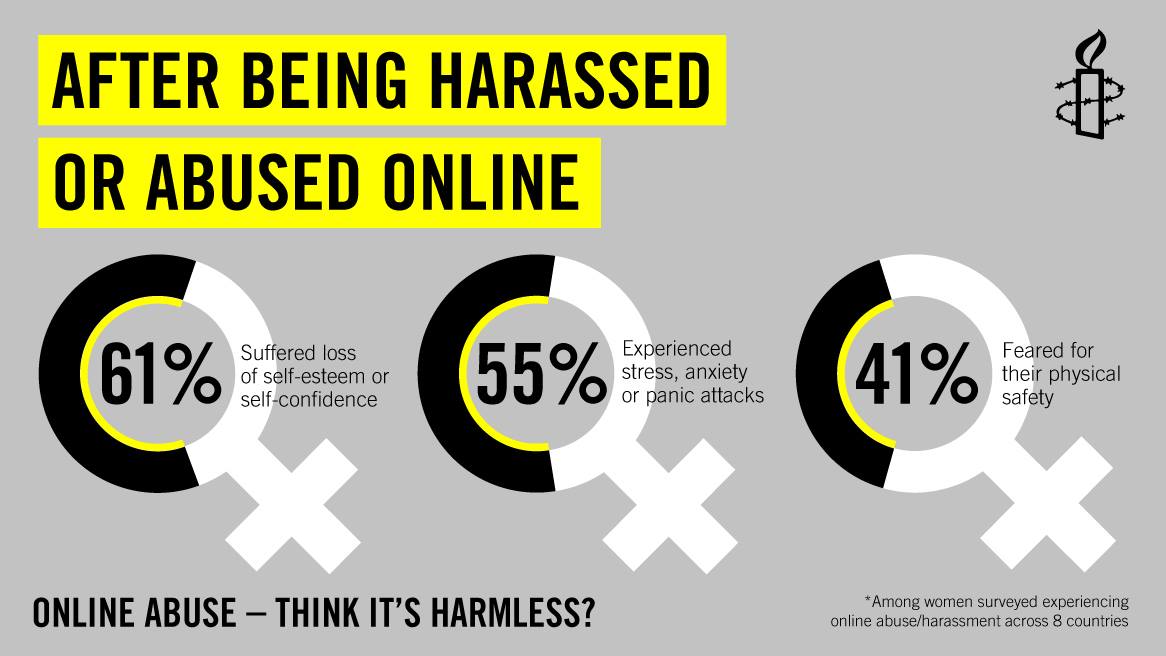Caring for myself is not self-indulgence, it is self-preservation, and that is an act of political warfare. – Audre Lorde
Taking care of yourself both emotionally and physically is crucial to preserve your ability to express yourself freely online.

An attack on your identity or sense of physical safety can take a serious emotional toll on an individual, so it’s critical to take care of yourself before, during, and after an episode of online harassment. Self-care is an essential component of producing one’s work and nurturing one’s ideas. So if you’re going to continue to write and publish online—and we hope you do—consider pursuing one or several of the following options to accommodate your unique situation.
Follow this advice from from professional psychologists.
- Get enough quality sleep to maintain good mental health. Make sure to establish a consistent sleep routine and prioritize getting enough restful sleep each night. This can include creating a comfortable sleeping environment, avoiding electronic devices before bedtime, and practicing relaxation techniques such as meditation or deep breathing exercises to help calm your mind and body.
- Turn off your phone—especially your notifications—at night. If possible, silence your phone, put it in a drawer, and then set a kitchen timer and engage in another activities for a fixed period of time. At night, consider turning off your notifications altogether so you can sleep undisturbed.
- Practice breathing exercises. Deep breathing can slow the heartbeat and stabilize blood pressure. When we focus on our breath, we are in the present moment, where we find safety. Breathwork is one of the strongest ways you can switch from a state of “fight or flight” to a state of “rest and digest.” By returning to our bodies, we are returning home to ourselves and away from the things that are outside of our control.
- Move your body. Dancing, doing yoga, and moving your body is very beneficial if you spend a lot of time working from home or in an office. There are specific exercises to connect with your body, calm your mind, and give way to your physical sensations.
- Keep a journal. Journaling about your online experience can be a helpful means of processing your feelings and can also give you important distance from the experience. You can either journal in an offline document on your computer or phone, or in a physical notebook.
- Read and write. For writers and journalists, this tends to be a no-brainer: Reading and writing—especially material that diverges from your day-to-day genres—can help relieve stress.
- Practice self-compassion. Self-compassion is when we practice empathy towards ourselves. This can look like writing a letter to yourself with reassurances that you’d give a friend who’s dealing with a similar situation. Self-compassion can also look like shifting your inner dialogue by fighting thoughts of regret such as “I should have done so and so” and replacing them with thoughts of self-acceptance, such as “I tried my best and will do better next time.” Self-acceptance is when we acknowledge that we did the best we could with the tools and knowledge we had at the time.
Try repeating affirmations such as “I forgive myself, I accept myself, I love myself, I am safe.” It may sound silly, but affirmations help us alter the way our subconscious minds think and feel – and subsequently inform our conscious minds with healthy thinking patterns geared towards self-compassion and acceptance.
- Listen to music. Music is a proven mood enhancer and can help listeners connect more closely to the world around them.
- Explore the artist within you. Focusing on an image with a pencil in hand and reproducing it on a surface helps calm the mind and relieve stress and anxiety.
- Sip a warm beverage (other than caffeine!) like herbal tea, hot chocolate or milk.
- Make your bed. Decluttering a room or taking a step as simple as making your bed can be a surprisingly simple anxiety reliever.
- Create a work or home environment that is healing to you. A healing environment is a place that promotes your wellness and wellbeing, and is nurturing in nature. This is an environment that has the right noise and lighting level, it has plants for improved air flow, and it has colors and pictures that are soothing for you. This is an environment where you only allow positivity, and things that bring you joy through music, books and games. Although it might not always be possible, you might want to try to create as much as possible this healing environment.
- Maintain your religious practice, if you have one. Not everyone follows a religious practice, and that’s fine. But if you do, this can be a good way to center yourself or to seek solace in a community of like-minded people.
- Meditate. Meditation has been practiced for thousands of years, with good reason: It can produce a deep state of relaxation and help relieve deep stress and anxiety. If you’re unfamiliar with the practice and want a place to start, try a free guided-meditation.
- Splurge on some body work. Massages can greatly help reduce physical stresses related to your emotional ones. If accessible to you, try visiting your local hammam and spend the day there.
- Head into nature. As John Keats wrote, “The poetry of the earth is never dead.” Get some sun. Daylight exposure is tied to a good night’s sleep
- Spend time with a pet, a child you love, or both. Spending time with people and animals whose lives are significantly less complicated is a nice reprieve from the complications of your own life.


